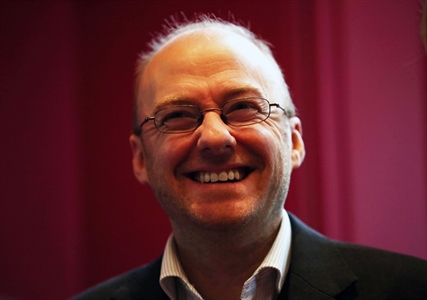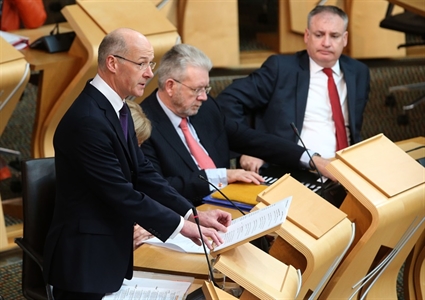10.10.14
Scottish parties submit devolution plans to Smith Commission
Today marks the deadline for Scottish political parties to submit their views on how powers should be devolved from Westminster to Holyrood, following the No vote in the referendum on Scottish independence.
The submissions from the SNP, Labour, Conservatives, Liberal Democrats and Greens to Lord Smith of Kelvin’s Scotland Devolution Commission will pave the way for cross-party talks to begin.
Lord Smith was appointed by PM David Cameron to lead the commission, set up to deliver on the pre-referendum vow by pro-union parties to guarantee more powers for Scotland.
He has warned politicians that they must come to the table willing to compromise. In an interview with The Sun newspaper, he said: “The success or failure of this rests with the politicians. I’m good at trying to get agreements from people with disparate views, but if there is material change from what’s agreed I will be quite vocal about it. If I fail, they fail.”
“There is no way I will satisfy everyone,” he added. “Whatever we come up with won’t be perfect from any one party’s point of view.
“But it’s got to be the right deal for Scotland and the UK.”
Conservatives, Liberal Democrats and Greens have all already made their submissions but the commission is still waiting on the SNP and Labour.
In a letter to Lord Smith, the Scottish Liberal Democrat leader Willie Rennie MSP said: “‘Home Rule’ for Scotland in a federal United Kingdom has been our core objective for decades.”
He went on to say that Scotland must be given the fiscal powers to raise most of the money it spends, but issues like welfare and defence should remain with the UK government.
The Conservatives said Holyrood must be responsible for setting the rates and bands of personal income tax as well as a share of VAT. On welfare they agreed with the Lib Dems that the state pension should remain the responsibility of the UK government but said there is a case for devolving some benefits and conferring on the Scottish Parliament the power to supplement welfare benefits legislated for at UK level.
The pro-independence Greens called for the Scottish Parliament to gain wide economic powers, including borrowing and taxation, and control over most of the welfare system in addition to further energy powers.
Talking about her party’s proposals, Scottish Conservative leader Ruth Davidson MSP said: “We believe decision makers should focus on where government money comes from as well as how it’s distributed.”

(Image: Patrick Harvie MSP c. David Cheskin/PA Wire)
Green party co-leader, Patrick Harvie MSP said: “The UK political parties committed to a very tight timescale, and cannot now ignore that commitment without betraying public trust. But that leaves the Smith Commission with almost no scope for meaningful public engagement.
“The danger is that the infectious energy of the referendum debate is followed by the familiar sight of a stitch-up between political parties. We will do our best to work constructively with the others on the Commission, but the first item on the agenda for me is to encourage Lord Smith to agree an urgent programme of open public engagement so that the people of Scotland have the chance to shape the country’s future.”
Lord Smith has also revealed his timetable for discussions has been delayed, saying the first all-party meeting of the commission would now be held on 22 October instead of next week. However, he said talks with individual parties would be held over the next seven days.
He has also revealed that he asked for views on Scotland's powers from civic groups, he said he has spoken with the leaders of over 50 organisations and written to a further 80 asking for their views.
The commission has also received more than 700 emails from members of the public.
Meanwhile in his budget speech to Holyrood, finance secretary John Swinney announced a new Land and Building Transactions Tax that marks the first time Scottish Parliament has levied taxation since the Union in 1707. This was made possible after new powers were devolved to Holyrood two years ago, following proposals put forward by the Calman Commission on strengthening devolution.
The new tax does away with stamp duty and will see a marginal tax of 2% apply to the proportion of a transaction between £135,000 and £250,000, while a 10% rate will apply to those between £250,000 and £1m.
Swinney told MSPs: "As a result of the rates I have announced today, nobody will pay tax on the first £135,000 of their house purchase. Five thousand more transactions will be taken out of tax, supporting first-time buyers and those buying properties in the affordable market."

(Image: John Swinney c. Andrew Milligan/PA Wire)
He also said that that the 12% top rate would ensure the most well-off made a contribution to the public purse.
Labour finance spokesman Iain Gray welcomed the move to replace stamp duty, but said successive Scottish budgets had failed to protect the NHS.
The Conservatives Gavin Brown attacked the new property tax, asking: "How can the cabinet secretary justify an eye-watering 10% tax on houses over the value of £250,000?
"There are pockets of this country, such as Edinburgh, where family homes for hard-working families are considerably in excess of that.
"We all understand that it increases as houses go up but 10% I think is difficult to justify."
Scottish Liberal Democrat leader Willie Rennie said the budget, which still needs the final approval of parliament, needed further work to ensure it delivered for families.
(Headline Image: Lord Smith of Kelvin c. Danny Lawson/PA Wire)
Tell us what you think – have your say below or email [email protected]